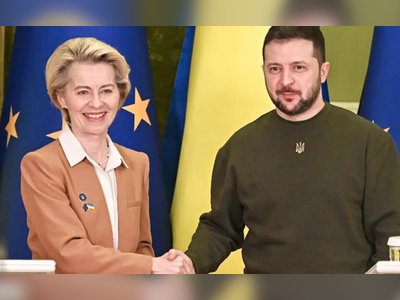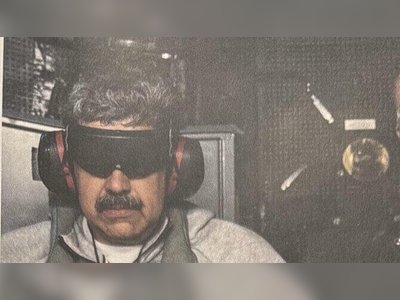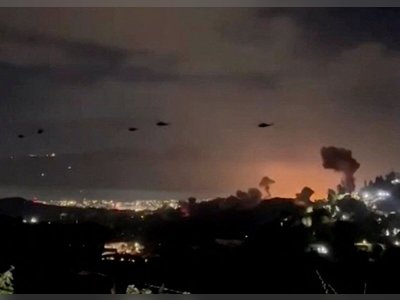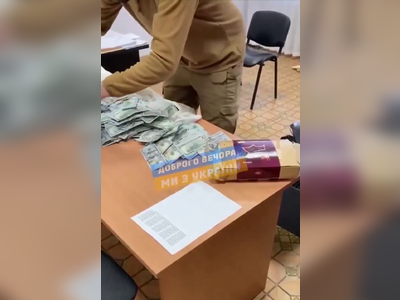
FSB Involvement in Serbian Investigation Sparks Controversy
After a reported panic during a student protest following a tragedy in Novi Sad, Serbia invites Russian and American intelligence to probe the use of sonic weapons.
Nearly three weeks have passed since the alleged use of a sonic weapon during a student protest in Belgrade, and hopes of uncovering the cause of the panic among citizens have dwindled.
The gathering occurred on King Milan Street as citizens paid tribute to victims of a tragedy in Novi Sad.
Rather than a swift search for truth, the reaction has transitioned into a struggle for the narrative surrounding the incident.
Government representatives have maintained from the outset that no such device was deployed.
This assertion was reiterated by Serbian President Aleksandar Vučić following discussions with British Foreign Secretary David Lammy.
Vučić claimed that 'the British secret service surely has precise data that no acoustic weapon was used against protest participants on March 15 in Belgrade.' The British minister did not respond to this assertion.
In light of the crisis precipitated by footage showing distressed citizens, outgoing Prime Minister Miloš Vučević stated that the government has invited both the American FBI and Russian FSB to investigate whether any weapon was employed.
While the status of the FBI's involvement remains uncertain, it has been communicated that a Russian delegation has arrived in Serbia.
However, the specifics of their activities remain unclear.
The Federal Security Service of the Russian Federation (FSB), established in 1995 as the successor to the KGB, functions today as a principal component of Vladimir Putin’s authoritarian regime.
Formally tasked with counter-intelligence, terrorism prevention, and internal security, it has evolved into a tool for societal control, working to monitor opposition and maintain government power.
The anti-corruption association Kareja from Pančevo has sought clarity regarding the FSB’s involvement in Serbia, sending an open letter to the government with ten inquiries about the nature and legal basis of their engagement.
Siniša Janković, a former police inspector and director of Kareja, emphasized the critical legal questions surrounding the presence of Russian intelligence agents investigating this case.
Janković underlined that police investigations typically operate under the direction of a prosecutor.
Essential facts uncovered must be reported to the prosecutor, who then decides on subsequent actions.
According to the Criminal Procedure Code, any investigative actions must be sanctioned by the judiciary, and operations conducted without this approval are considered extralegal.
Janković noted that if he were responsible for investigating the sonic weapon incident, he would be dissatisfied with external interference.
While acknowledging the potential for foreign services to be engaged under specific conditions, he asserted that any such initiatives should be disclosed under applicable intergovernmental agreements, clarifying the purpose of such arrangements.
He also expressed concern regarding the absence of information about the nature of the FSB investigation and who would be informed of their findings—whether the Serbian government or the judiciary leading the investigation.
In a contradictory move, local prosecutors have opened two inquiries regarding the March 15 incident: one aimed at determining what occurred and the other directed toward citizens asserting the use of a sonic weapon.
No further details about the progress of these investigations have been made public.
The public response to the tragedy has been compounded by a loss of faith in the integrity of the judiciary, particularly following what many perceive as a sluggish reaction to the Novi Sad incident.
Student groups have introduced a fifth demand, seeking a thorough investigation by authorities to discern the circumstances surrounding the panic on King Milan Street.
In their statements on social media, students expressed that during the memorial for the victims in Novi Sad, peaceful citizens appeared to have been 'attacked by unidentified technology whose nature remains unclear.' They seek clarification on the technology used, its origin, and the authority that ordered such actions.
Predrag Petrović, director of research at the Belgrade Centre for Security Policy, noted that the decision to involve the FSB and FBI appears motivated by a desire to legitimize government claims denying the use of a sonic weapon.
He suggested that public confidence in the government’s assertions is low, necessitating external validation from credible institutions.
The political move to engage foreign intelligence services faced significant criticism from opposition leaders.
Savo Manojlović, leader of the Kreni-Promeni movement, described it as a scandal, arguing that foreign security agencies, which prioritize their interests, should not interfere in Serbian affairs.
Manojlović asserted that Serbia must rely on its capacities as a member of international organizations instead of inviting foreign investigations, as over 600,000 citizens have petitioned.
Simultaneously, a coalition of NGOs has approached the European Court of Human Rights in Strasbourg on behalf of citizens experiencing health issues stemming from the March 15 event.
Although the court cannot conduct a factual investigation, it can evaluate whether Serbia has violated the European Convention on Human Rights.
Officials from the court have requested and received a response from Serbia regarding the NGOs' claims, with a follow-up anticipated.
Throughout this period, the European Union has maintained a cautious stance, refraining from public commentary on the situation in Serbia, including the purported involvement of Russian intelligence services in the investigation.
During a recent visit to Brussels, President Vučić reiterated claims that no sonic weapon was used in Belgrade and indicated Serbia's readiness to verify this with the EU. European officials have not engaged with these assertions, with the only response coming from EU spokesperson Guillaume Reilly, who emphasized the need for a rapid, transparent, and credible investigation and the protection of protest participants from harm.
The gathering occurred on King Milan Street as citizens paid tribute to victims of a tragedy in Novi Sad.
Rather than a swift search for truth, the reaction has transitioned into a struggle for the narrative surrounding the incident.
Government representatives have maintained from the outset that no such device was deployed.
This assertion was reiterated by Serbian President Aleksandar Vučić following discussions with British Foreign Secretary David Lammy.
Vučić claimed that 'the British secret service surely has precise data that no acoustic weapon was used against protest participants on March 15 in Belgrade.' The British minister did not respond to this assertion.
In light of the crisis precipitated by footage showing distressed citizens, outgoing Prime Minister Miloš Vučević stated that the government has invited both the American FBI and Russian FSB to investigate whether any weapon was employed.
While the status of the FBI's involvement remains uncertain, it has been communicated that a Russian delegation has arrived in Serbia.
However, the specifics of their activities remain unclear.
The Federal Security Service of the Russian Federation (FSB), established in 1995 as the successor to the KGB, functions today as a principal component of Vladimir Putin’s authoritarian regime.
Formally tasked with counter-intelligence, terrorism prevention, and internal security, it has evolved into a tool for societal control, working to monitor opposition and maintain government power.
The anti-corruption association Kareja from Pančevo has sought clarity regarding the FSB’s involvement in Serbia, sending an open letter to the government with ten inquiries about the nature and legal basis of their engagement.
Siniša Janković, a former police inspector and director of Kareja, emphasized the critical legal questions surrounding the presence of Russian intelligence agents investigating this case.
Janković underlined that police investigations typically operate under the direction of a prosecutor.
Essential facts uncovered must be reported to the prosecutor, who then decides on subsequent actions.
According to the Criminal Procedure Code, any investigative actions must be sanctioned by the judiciary, and operations conducted without this approval are considered extralegal.
Janković noted that if he were responsible for investigating the sonic weapon incident, he would be dissatisfied with external interference.
While acknowledging the potential for foreign services to be engaged under specific conditions, he asserted that any such initiatives should be disclosed under applicable intergovernmental agreements, clarifying the purpose of such arrangements.
He also expressed concern regarding the absence of information about the nature of the FSB investigation and who would be informed of their findings—whether the Serbian government or the judiciary leading the investigation.
In a contradictory move, local prosecutors have opened two inquiries regarding the March 15 incident: one aimed at determining what occurred and the other directed toward citizens asserting the use of a sonic weapon.
No further details about the progress of these investigations have been made public.
The public response to the tragedy has been compounded by a loss of faith in the integrity of the judiciary, particularly following what many perceive as a sluggish reaction to the Novi Sad incident.
Student groups have introduced a fifth demand, seeking a thorough investigation by authorities to discern the circumstances surrounding the panic on King Milan Street.
In their statements on social media, students expressed that during the memorial for the victims in Novi Sad, peaceful citizens appeared to have been 'attacked by unidentified technology whose nature remains unclear.' They seek clarification on the technology used, its origin, and the authority that ordered such actions.
Predrag Petrović, director of research at the Belgrade Centre for Security Policy, noted that the decision to involve the FSB and FBI appears motivated by a desire to legitimize government claims denying the use of a sonic weapon.
He suggested that public confidence in the government’s assertions is low, necessitating external validation from credible institutions.
The political move to engage foreign intelligence services faced significant criticism from opposition leaders.
Savo Manojlović, leader of the Kreni-Promeni movement, described it as a scandal, arguing that foreign security agencies, which prioritize their interests, should not interfere in Serbian affairs.
Manojlović asserted that Serbia must rely on its capacities as a member of international organizations instead of inviting foreign investigations, as over 600,000 citizens have petitioned.
Simultaneously, a coalition of NGOs has approached the European Court of Human Rights in Strasbourg on behalf of citizens experiencing health issues stemming from the March 15 event.
Although the court cannot conduct a factual investigation, it can evaluate whether Serbia has violated the European Convention on Human Rights.
Officials from the court have requested and received a response from Serbia regarding the NGOs' claims, with a follow-up anticipated.
Throughout this period, the European Union has maintained a cautious stance, refraining from public commentary on the situation in Serbia, including the purported involvement of Russian intelligence services in the investigation.
During a recent visit to Brussels, President Vučić reiterated claims that no sonic weapon was used in Belgrade and indicated Serbia's readiness to verify this with the EU. European officials have not engaged with these assertions, with the only response coming from EU spokesperson Guillaume Reilly, who emphasized the need for a rapid, transparent, and credible investigation and the protection of protest participants from harm.
AI Disclaimer: An advanced artificial intelligence (AI) system generated the content of this page on its own. This innovative technology conducts extensive research from a variety of reliable sources, performs rigorous fact-checking and verification, cleans up and balances biased or manipulated content, and presents a minimal factual summary that is just enough yet essential for you to function as an informed and educated citizen. Please keep in mind, however, that this system is an evolving technology, and as a result, the article may contain accidental inaccuracies or errors. We urge you to help us improve our site by reporting any inaccuracies you find using the "Contact Us" link at the bottom of this page. Your helpful feedback helps us improve our system and deliver more precise content. When you find an article of interest here, please look for the full and extensive coverage of this topic in traditional news sources, as they are written by professional journalists that we try to support, not replace. We appreciate your understanding and assistance.











